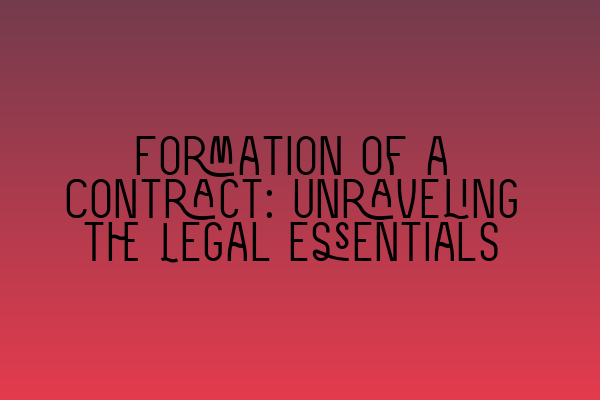Formation of a Contract: Unraveling the Legal Essentials
Welcome to SQE Contract Law! In this blog post, we will dive into the intricacies of contract formation, exploring the key legal essentials that determine the validity and enforceability of contracts. Whether you’re a law student, legal professional or simply interested in understanding the foundations of contract law, this article will provide you with valuable insights.
Before we proceed, it’s essential to note that contract law varies from jurisdiction to jurisdiction. In this post, we will primarily focus on the general principles of contract formation that are widely recognized in common law jurisdictions.
So, what is a contract? At its core, a contract is an agreement between two or more parties that creates legally binding obligations. To be enforceable, a contract must meet certain essential elements, which we will discuss in detail below.
1. Offer and Acceptance:
Contract formation begins with the communication of an offer by one party to another. An offer is a clear expression of willingness to enter into a contract on specific terms. The offer must be definite, certain, and communicated to the offeree (the party to whom the offer is made). Once the offeree accepts the offer without any modifications, a bilateral contract is formed.
It’s important to mention that acceptance must be communicated to the offeror. The general rule is that acceptance is effective upon communication, not upon receipt. However, there are exceptions to this rule, such as the postal rule, which deems acceptance effective upon posting the acceptance letter.
2. Consideration:
Consideration refers to something of value exchanged between the parties, such as money, goods, services, or a promise to do or refrain from doing something. It serves as the ‘price’ each party pays to enter into the contract and is a crucial element in determining the enforceability of the agreement.
For instance, if Party A promises to pay Party B a certain amount in exchange for Party B delivering a product, both the promise and the delivery of the product constitute consideration.
3. Intention to Create Legal Relations:
For a contract to be valid, the parties must display an intention to create legal relations. In other words, the agreement must be more than a mere social arrangement. While domestic or informal agreements may lack this intention, most commercial agreements do have this requirement fulfilled.
It’s worth noting that certain types of agreements, like those made between family members or friends, may not possess the intention to create legal relations. However, they can still be binding if they meet the other essential elements, such as consideration.
4. Capacity:
To enter into a contract, the parties must have the legal capacity to do so. This means that they must be of sound mind, of legal age, and not under any legal disability. Minors, intoxicated individuals, and those with mental disabilities may lack the capacity to contract. However, there are exceptions in certain circumstances, such as contracts for necessaries or with parental consent.
5. Certainty of Terms:
For a contract to be enforceable, its terms must be clear, complete, and certain. The agreement should specify the rights, obligations, and responsibilities of each party with clarity and sufficient detail. Vague or uncertain terms may render the contract void or unenforceable.
6. Free Consent:
Consent is a fundamental requirement for contract formation. The parties must freely and voluntarily agree to the terms of the contract without any duress, coercion, misrepresentation, or undue influence.
It’s crucial to note that if a party entered into a contract under undue influence or misrepresentation, the contract may be voidable at the innocent party’s option.
Conclusion:
Understanding the legal essentials of contract formation is vital to ensure the validity and enforceability of agreements. By considering the elements of offer and acceptance, consideration, intention to create legal relations, capacity, certainty of terms, and free consent, parties can create contracts with confidence.
If you found this article helpful, you might also be interested in our related articles on SQE 1 Practice Exam Questions, SQE 1 Practice Mocks FLK1 FLK2, SQE 2 Preparation Courses, SQE 1 Preparation Courses, and SRA SQE Exam Dates. These resources will expand your knowledge and help you prepare for upcoming exams or enhance your understanding of contract law.
To stay updated with our latest posts and receive valuable insights into contract law and other legal topics, don’t forget to subscribe to our newsletter.
Thank you for reading and we hope this article has shed light on the formation of contracts. Stay tuned for more informative content from SQE Contract Law!
